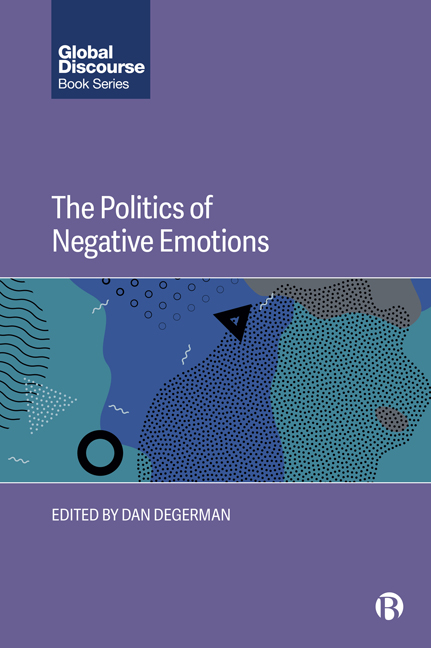Book contents
- Frontmatter
- Contents
- List of Figures
- Notes on Contributors
- Introduction: Feeling Our Way through Politics
- 1 Anger, Fast and Slow: Mediations of Justice and Violence in the Age of Populism
- 2 ‘We Will March Side by Side and Demand a Bigger Table’: Anger as Dignity Claim
- 3 Moving between Frustration and Anger
- 4 The Resentment– Ressentiment Complex: A Critique of Liberal Discourse
- 5 Green Shame: The Next Moral Revolution?
- 6 Against Comfort: Political Implications of Evading Discomfort
- 7 For Love and for Life: Emotional Dynamics at the World Congress of Families
- 8 The Functionality of Affects: Conceptualising Far-Right Populist Politics beyond Negative Emotions
- 9 Moral Economies of Exclusion: Politics of Fear through Antagonistic Anonymity
- 10 Contesting the Politics of Negative Emotions in Educational Policy Making: A Ban on Asylum Seekers’ School Visits in Finland
- Index
Introduction: Feeling Our Way through Politics
Published online by Cambridge University Press: 18 January 2024
- Frontmatter
- Contents
- List of Figures
- Notes on Contributors
- Introduction: Feeling Our Way through Politics
- 1 Anger, Fast and Slow: Mediations of Justice and Violence in the Age of Populism
- 2 ‘We Will March Side by Side and Demand a Bigger Table’: Anger as Dignity Claim
- 3 Moving between Frustration and Anger
- 4 The Resentment– Ressentiment Complex: A Critique of Liberal Discourse
- 5 Green Shame: The Next Moral Revolution?
- 6 Against Comfort: Political Implications of Evading Discomfort
- 7 For Love and for Life: Emotional Dynamics at the World Congress of Families
- 8 The Functionality of Affects: Conceptualising Far-Right Populist Politics beyond Negative Emotions
- 9 Moral Economies of Exclusion: Politics of Fear through Antagonistic Anonymity
- 10 Contesting the Politics of Negative Emotions in Educational Policy Making: A Ban on Asylum Seekers’ School Visits in Finland
- Index
Summary
Anger, fear, grief, shame and other negative emotions have been at the heart of political events in recent years. These are emotions that have long been subject to suspicion in political scholarship. There are some good reasons for this. Negative emotions can be politically destructive, leading people to act rashly and without due concern for democratic principles or fellow citizens. Arguably, the rise of far-right populism and the protests against restrictions during the COVID pandemic both testify to this. But, in condemning the vices of negative emotions, it is easy to overlook their virtues. They can, for example, accurately signal that we have been wronged, that we have done something wrong, or that something we value is threatened, and motivate us to act to redress the situation, sometimes in concert with other people. Indeed, the capacity of emotions like fear and anger to do just this has been on display in the Black Lives Matter and climate change movements.
This volume brings together perspectives from philosophy and political science to shed new light on negative emotions in public life, highlighting both the constructive and destructive potential of these experiences. Each chapter investigates what recent political events in different parts of the world reveal about the political character of an emotion or particular set of emotions. These include much-discussed emotions, like anger and fear, and less prominent ones, like frustration and discomfort. The overall result is a dynamic set of tools that can help us better understand and navigate our current crises.
However, the chapters in this volume do not directly address the question of what it is about negative emotions that makes them negative. Indeed, in reading this volume, one might be struck that a common theme across most of the contributions is that whatever is negative about these emotions, it is not that they are always morally or politically bad. In fact, they are often good. Beyond this, the contributors might find little agreement about what makes an emotion negative rather than positive or, to put it more technically, what determines the valence of an emotion, if that is even a coherent concept.
- Type
- Chapter
- Information
- The Politics of Negative Emotions , pp. 1 - 9Publisher: Bristol University PressPrint publication year: 2023

